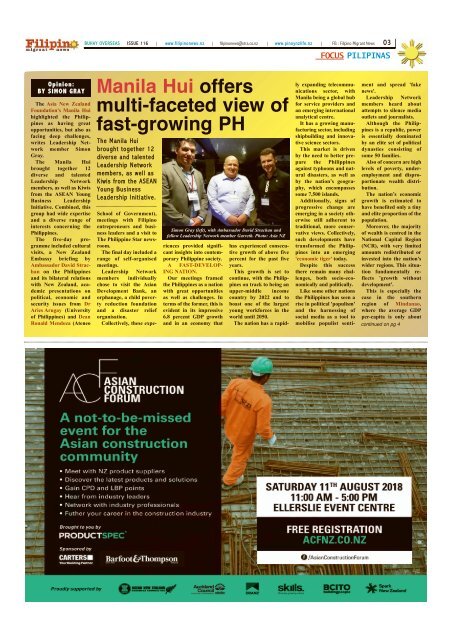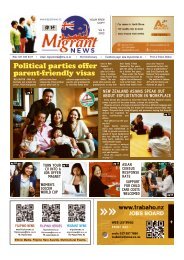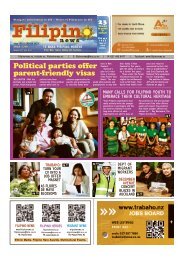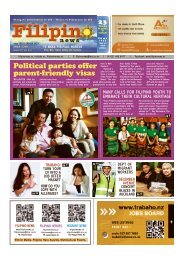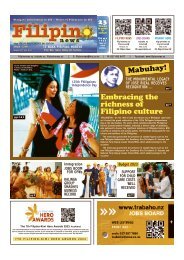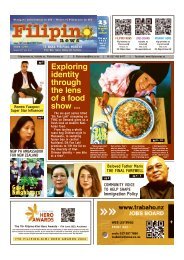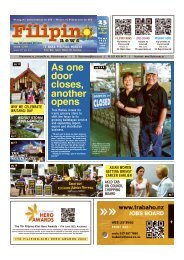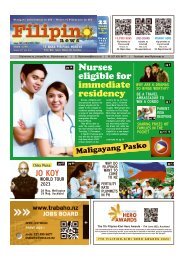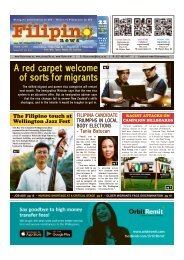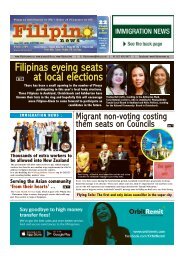Filipino News JULY 2018
Nationwide Filipino Paper in New Zealand : www.filipinonews.nz; South Island Filipino Paper : www.pinoynzlife.nz Advertising: filipinonews@xtra.co.nz Mobile: 027 495 8477
Nationwide Filipino Paper in New Zealand : www.filipinonews.nz;
South Island Filipino Paper : www.pinoynzlife.nz
Advertising: filipinonews@xtra.co.nz
Mobile: 027 495 8477
Create successful ePaper yourself
Turn your PDF publications into a flip-book with our unique Google optimized e-Paper software.
BUHAY OVERSEAS ISSUE 116 | www.filipinonews.nz | filipinonews@xtra.co.nz | www.pinoynzlife.nz | FB : <strong>Filipino</strong> Migrant <strong>News</strong> 03<br />
FOCUS PILIPINAS<br />
Opinion:<br />
BY SIMON GRAY<br />
The Asia New Zealand<br />
Foundation's Manila Hui<br />
highlighted the Philippines<br />
as having great<br />
opportunities, but also as<br />
facing deep challenges,<br />
writes Leadership Network<br />
member Simon<br />
Gray.<br />
The Manila Hui<br />
brought together 12<br />
diverse and talented<br />
Leadership Network<br />
members, as well as Kiwis<br />
from the ASEAN Young<br />
Business Leadership<br />
Initiative. Combined, this<br />
group had wide expertise<br />
and a diverse range of<br />
interests concerning the<br />
Philippines.<br />
The five-day programme<br />
included cultural<br />
visits, a New Zealand<br />
Embassy briefing by<br />
Ambassador David Strachan<br />
on the Philippines<br />
and its bilateral relations<br />
with New Zealand, academic<br />
presentations on<br />
political, economic and<br />
security issues from Dr<br />
Aries Arugay (University<br />
of Philippines) and Dean<br />
Ronald Mendoza (Ateneo<br />
Manila Hui offers<br />
multi-faceted view of<br />
fast-growing PH<br />
The Manila Hui<br />
brought together 12<br />
diverse and talented<br />
Leadership Network<br />
members, as well as<br />
Kiwis from the ASEAN<br />
Young Business<br />
Leadership Initiative.<br />
School of Government),<br />
meetings with <strong>Filipino</strong><br />
entrepreneurs and business<br />
leaders and a visit to<br />
The Philippine Star newsroom.<br />
The final day included a<br />
range of self-organised<br />
meetings.<br />
Leadership Network<br />
Simon Gray (left), with Ambassador David Strachan and<br />
fellow Leadership Network member Garreth. Photo: Asia NZ<br />
members individually<br />
chose to visit the Asian<br />
Development Bank, an<br />
orphanage, a child poverty<br />
reduction foundation<br />
and a disaster relief<br />
organisation.<br />
Collectively, these experiences<br />
provided significant<br />
insights into contemporary<br />
Philippine society.<br />
A FAST-DEVELOP-<br />
ING NATION.<br />
Our meetings framed<br />
the Philippines as a nation<br />
with great opportunities<br />
as well as challenges. In<br />
terms of the former, this is<br />
evident in its impressive<br />
6.8 percent GDP growth<br />
and in an economy that<br />
has experienced consecutive<br />
growth of above five<br />
percent for the past five<br />
years.<br />
This growth is set to<br />
continue, with the Philippines<br />
on track to being an<br />
upper-middle income<br />
country by 2022 and to<br />
boast one of the largest<br />
young workforces in the<br />
world until 2050.<br />
The nation has a rapidly<br />
expanding telecommunications<br />
sector, with<br />
Manila being a global hub<br />
for service providers and<br />
an emerging international<br />
analytical centre.<br />
It has a growing manufacturing<br />
sector, including<br />
shipbuilding and innovative<br />
science sectors.<br />
This market is driven<br />
by the need to better prepare<br />
the Philippines<br />
against typhoons and natural<br />
disasters, as well as<br />
by the nation’s geography,<br />
which encompasses<br />
some 7,500 islands.<br />
Additionally, signs of<br />
progressive change are<br />
emerging in a society otherwise<br />
still adherent to<br />
traditional, more conservative<br />
views. Collectively,<br />
such developments have<br />
transformed the Philippines<br />
into an emerging<br />
'economic tiger' today.<br />
Despite this success<br />
there remain many challenges,<br />
both socio-economically<br />
and politically.<br />
Like some other nations<br />
the Philippines has seen a<br />
rise in political 'populism'<br />
and the harnessing of<br />
social media as a tool to<br />
mobilise populist sentiment<br />
and spread 'fake<br />
news'.<br />
Leadership Network<br />
members heard about<br />
attempts to silence media<br />
outlets and journalists.<br />
Although the Philippines<br />
is a republic, power<br />
is essentially dominated<br />
by an elite set of political<br />
dynasties consisting of<br />
some 50 families.<br />
Also of concern are high<br />
levels of poverty, underemployment<br />
and disproportionate<br />
wealth distribution.<br />
The nation’s economic<br />
growth is estimated to<br />
have benefited only a tiny<br />
and elite proportion of the<br />
population.<br />
Moreover, the majority<br />
of wealth is centred in the<br />
National Capital Region<br />
(NCR), with very limited<br />
amounts redistributed or<br />
invested into the nation's<br />
wider regions. This situation<br />
fundamentally reflects<br />
'growth without<br />
development'.<br />
This is especially the<br />
case in the southern<br />
region of Mindanao,<br />
where the average GDP<br />
per-capita is only about<br />
continued on pg 4


